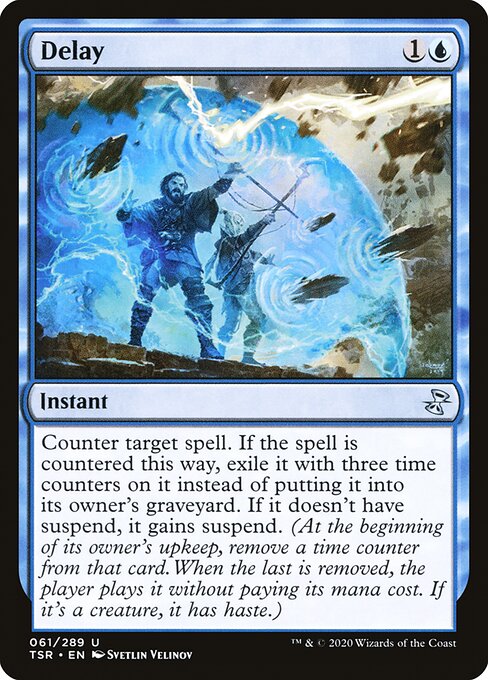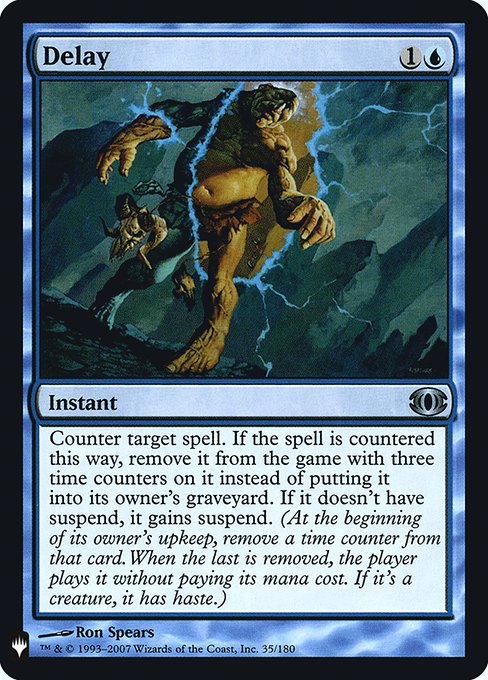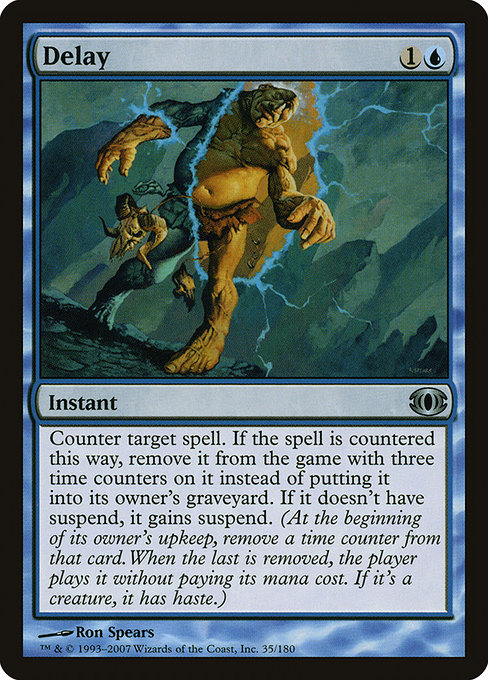Ritardo
Istantaneo
Neutralizza una magia bersaglio. Se la magia è neutralizzata in questo modo, esiliala con tre segnalini tempo su di essa invece di metterla nel cimitero del suo proprietario. Se non ha sospendere, guadagna sospendere. (All'inizio del mantenimento del suo proprietario, rimuovi un segnalino tempo da quella carta. Quando l'ultimo viene rimosso, il giocatore lancia la carta senza pagare il suo costo di mana. Se è una creatura, ha rapidità.)
standard
future
historic
gladiator
pioneer
explorer
modern
legacy
pauper
vintage
penny
commander
brawl
alchemy
paupercommander
duel
oldschool
premodern
Rulings
If the target spell was cast with flashback, Delay’s effect will exile it, not the flashback effect. The card will get time counters and gain suspend (if it didn’t already have suspend).
If the target spell is face down, it’ll be exiled face up. It can’t be cast face down when casting it without paying its mana cost.
When the last time counter is removed from the exiled card, it’s cast as a completely new spell. Modes and targets are chosen again. If the spell has any mandatory additional costs, they must be paid again. If they can’t be, the spell can’t be cast and stays exiled.
As the second triggered ability resolves, you must cast the card if able. You must do so even if it requires targets and the only legal targets are ones that you really don’t want to target. Timing permissions based on the card’s type are ignored.
The mana value of a spell cast without paying its mana cost is determined by its mana cost, even though that cost wasn’t paid.
If the first triggered ability of suspend (the one that removes time counters) is countered, no time counter is removed. The ability will trigger again at the beginning of the card’s owner’s next upkeep.
Cards exiled with suspend are exiled face up.
When the last time counter is removed, the second triggered ability of suspend (the one that lets you cast the card) triggers. It doesn’t matter why the last time counter was removed or what effect removed it.
Suspend is a keyword that represents three abilities. The first is a static ability that allows you to exile the card from your hand with the specified number of time counters (the number before the dash) on it by paying its suspend cost (listed after the dash). The second is a triggered ability that removes a time counter from the suspended card at the beginning of each of your upkeeps. The third is a triggered ability that causes you to cast the card when the last time counter is removed. If you cast a creature spell this way, it gains haste until you lose control of that creature (or, in rare cases, you lose control of the creature spell while it’s on the stack).
Exiling a card with suspend isn’t casting that card. This action doesn’t use the stack and can’t be responded to.
If you cast a card “without paying its mana cost,” such as with suspend, you can’t choose to cast it for any alternative costs. You can, however, pay additional costs. If the card has any mandatory additional costs, you must pay those if you want to cast the card.
If an effect refers to a “suspended card,” that means a card that (1) has suspend, (2) is in exile, and (3) has one or more time counters on it.
You are never forced to activate mana abilities to pay costs, so if there is a mandatory additional mana cost (such as from Thalia, Guardian of Thraben), you can decline to activate mana abilities to pay for it and hence fail to cast the suspended card, leaving it in exile.
If the card has in its mana cost, you must choose 0 as the value of X when casting it without paying its mana cost.
If the second triggered ability is countered, the card can’t be cast. It remains exiled with no time counters on it, and it’s no longer suspended.
If you can’t cast the card, perhaps because there are no legal targets available, it remains exiled with no time counters on it, and it’s no longer suspended.
You can exile a card in your hand using suspend any time you could cast that card. Consider its card type, any effects that modify when you could cast it (such as flash) and any other effects that stop you from casting it (such as from Meddling Mage’s ability) to determine if and when you can do this. Whether you could actually complete all steps in casting the card is irrelevant. For example, you can exile a card with suspend that has no mana cost or that requires a target even if no legal targets are available at that time.
If the spell requires any targets, those targets are chosen when the spell is finally cast, not when it’s exiled.
If the target spell is face down, it’ll be exiled face up. It can’t be cast face down when casting it without paying its mana cost.
When the last time counter is removed from the exiled card, it’s cast as a completely new spell. Modes and targets are chosen again. If the spell has any mandatory additional costs, they must be paid again. If they can’t be, the spell can’t be cast and stays exiled.
As the second triggered ability resolves, you must cast the card if able. You must do so even if it requires targets and the only legal targets are ones that you really don’t want to target. Timing permissions based on the card’s type are ignored.
The mana value of a spell cast without paying its mana cost is determined by its mana cost, even though that cost wasn’t paid.
If the first triggered ability of suspend (the one that removes time counters) is countered, no time counter is removed. The ability will trigger again at the beginning of the card’s owner’s next upkeep.
Cards exiled with suspend are exiled face up.
When the last time counter is removed, the second triggered ability of suspend (the one that lets you cast the card) triggers. It doesn’t matter why the last time counter was removed or what effect removed it.
Suspend is a keyword that represents three abilities. The first is a static ability that allows you to exile the card from your hand with the specified number of time counters (the number before the dash) on it by paying its suspend cost (listed after the dash). The second is a triggered ability that removes a time counter from the suspended card at the beginning of each of your upkeeps. The third is a triggered ability that causes you to cast the card when the last time counter is removed. If you cast a creature spell this way, it gains haste until you lose control of that creature (or, in rare cases, you lose control of the creature spell while it’s on the stack).
Exiling a card with suspend isn’t casting that card. This action doesn’t use the stack and can’t be responded to.
If you cast a card “without paying its mana cost,” such as with suspend, you can’t choose to cast it for any alternative costs. You can, however, pay additional costs. If the card has any mandatory additional costs, you must pay those if you want to cast the card.
If an effect refers to a “suspended card,” that means a card that (1) has suspend, (2) is in exile, and (3) has one or more time counters on it.
You are never forced to activate mana abilities to pay costs, so if there is a mandatory additional mana cost (such as from Thalia, Guardian of Thraben), you can decline to activate mana abilities to pay for it and hence fail to cast the suspended card, leaving it in exile.
If the card has in its mana cost, you must choose 0 as the value of X when casting it without paying its mana cost.
If the second triggered ability is countered, the card can’t be cast. It remains exiled with no time counters on it, and it’s no longer suspended.
If you can’t cast the card, perhaps because there are no legal targets available, it remains exiled with no time counters on it, and it’s no longer suspended.
You can exile a card in your hand using suspend any time you could cast that card. Consider its card type, any effects that modify when you could cast it (such as flash) and any other effects that stop you from casting it (such as from Meddling Mage’s ability) to determine if and when you can do this. Whether you could actually complete all steps in casting the card is irrelevant. For example, you can exile a card with suspend that has no mana cost or that requires a target even if no legal targets are available at that time.
If the spell requires any targets, those targets are chosen when the spell is finally cast, not when it’s exiled.
Rulings
If the target spell was cast with flashback, Delay’s effect will exile it, not the flashback effect. The card will get time counters and gain suspend (if it didn’t already have suspend).
If the target spell is face down, it’ll be exiled face up. It can’t be cast face down when casting it without paying its mana cost.
When the last time counter is removed from the exiled card, it’s cast as a completely new spell. Modes and targets are chosen again. If the spell has any mandatory additional costs, they must be paid again. If they can’t be, the spell can’t be cast and stays exiled.
As the second triggered ability resolves, you must cast the card if able. You must do so even if it requires targets and the only legal targets are ones that you really don’t want to target. Timing permissions based on the card’s type are ignored.
The mana value of a spell cast without paying its mana cost is determined by its mana cost, even though that cost wasn’t paid.
If the first triggered ability of suspend (the one that removes time counters) is countered, no time counter is removed. The ability will trigger again at the beginning of the card’s owner’s next upkeep.
Cards exiled with suspend are exiled face up.
When the last time counter is removed, the second triggered ability of suspend (the one that lets you cast the card) triggers. It doesn’t matter why the last time counter was removed or what effect removed it.
Suspend is a keyword that represents three abilities. The first is a static ability that allows you to exile the card from your hand with the specified number of time counters (the number before the dash) on it by paying its suspend cost (listed after the dash). The second is a triggered ability that removes a time counter from the suspended card at the beginning of each of your upkeeps. The third is a triggered ability that causes you to cast the card when the last time counter is removed. If you cast a creature spell this way, it gains haste until you lose control of that creature (or, in rare cases, you lose control of the creature spell while it’s on the stack).
Exiling a card with suspend isn’t casting that card. This action doesn’t use the stack and can’t be responded to.
If you cast a card “without paying its mana cost,” such as with suspend, you can’t choose to cast it for any alternative costs. You can, however, pay additional costs. If the card has any mandatory additional costs, you must pay those if you want to cast the card.
If an effect refers to a “suspended card,” that means a card that (1) has suspend, (2) is in exile, and (3) has one or more time counters on it.
You are never forced to activate mana abilities to pay costs, so if there is a mandatory additional mana cost (such as from Thalia, Guardian of Thraben), you can decline to activate mana abilities to pay for it and hence fail to cast the suspended card, leaving it in exile.
If the card has in its mana cost, you must choose 0 as the value of X when casting it without paying its mana cost.
If the second triggered ability is countered, the card can’t be cast. It remains exiled with no time counters on it, and it’s no longer suspended.
If you can’t cast the card, perhaps because there are no legal targets available, it remains exiled with no time counters on it, and it’s no longer suspended.
You can exile a card in your hand using suspend any time you could cast that card. Consider its card type, any effects that modify when you could cast it (such as flash) and any other effects that stop you from casting it (such as from Meddling Mage’s ability) to determine if and when you can do this. Whether you could actually complete all steps in casting the card is irrelevant. For example, you can exile a card with suspend that has no mana cost or that requires a target even if no legal targets are available at that time.
If the spell requires any targets, those targets are chosen when the spell is finally cast, not when it’s exiled.
If the target spell is face down, it’ll be exiled face up. It can’t be cast face down when casting it without paying its mana cost.
When the last time counter is removed from the exiled card, it’s cast as a completely new spell. Modes and targets are chosen again. If the spell has any mandatory additional costs, they must be paid again. If they can’t be, the spell can’t be cast and stays exiled.
As the second triggered ability resolves, you must cast the card if able. You must do so even if it requires targets and the only legal targets are ones that you really don’t want to target. Timing permissions based on the card’s type are ignored.
The mana value of a spell cast without paying its mana cost is determined by its mana cost, even though that cost wasn’t paid.
If the first triggered ability of suspend (the one that removes time counters) is countered, no time counter is removed. The ability will trigger again at the beginning of the card’s owner’s next upkeep.
Cards exiled with suspend are exiled face up.
When the last time counter is removed, the second triggered ability of suspend (the one that lets you cast the card) triggers. It doesn’t matter why the last time counter was removed or what effect removed it.
Suspend is a keyword that represents three abilities. The first is a static ability that allows you to exile the card from your hand with the specified number of time counters (the number before the dash) on it by paying its suspend cost (listed after the dash). The second is a triggered ability that removes a time counter from the suspended card at the beginning of each of your upkeeps. The third is a triggered ability that causes you to cast the card when the last time counter is removed. If you cast a creature spell this way, it gains haste until you lose control of that creature (or, in rare cases, you lose control of the creature spell while it’s on the stack).
Exiling a card with suspend isn’t casting that card. This action doesn’t use the stack and can’t be responded to.
If you cast a card “without paying its mana cost,” such as with suspend, you can’t choose to cast it for any alternative costs. You can, however, pay additional costs. If the card has any mandatory additional costs, you must pay those if you want to cast the card.
If an effect refers to a “suspended card,” that means a card that (1) has suspend, (2) is in exile, and (3) has one or more time counters on it.
You are never forced to activate mana abilities to pay costs, so if there is a mandatory additional mana cost (such as from Thalia, Guardian of Thraben), you can decline to activate mana abilities to pay for it and hence fail to cast the suspended card, leaving it in exile.
If the card has in its mana cost, you must choose 0 as the value of X when casting it without paying its mana cost.
If the second triggered ability is countered, the card can’t be cast. It remains exiled with no time counters on it, and it’s no longer suspended.
If you can’t cast the card, perhaps because there are no legal targets available, it remains exiled with no time counters on it, and it’s no longer suspended.
You can exile a card in your hand using suspend any time you could cast that card. Consider its card type, any effects that modify when you could cast it (such as flash) and any other effects that stop you from casting it (such as from Meddling Mage’s ability) to determine if and when you can do this. Whether you could actually complete all steps in casting the card is irrelevant. For example, you can exile a card with suspend that has no mana cost or that requires a target even if no legal targets are available at that time.
If the spell requires any targets, those targets are chosen when the spell is finally cast, not when it’s exiled.
Your collection? Your decks?
Want to manage your collection and/or create decks?



 0
0
 1.31€
1.31€

